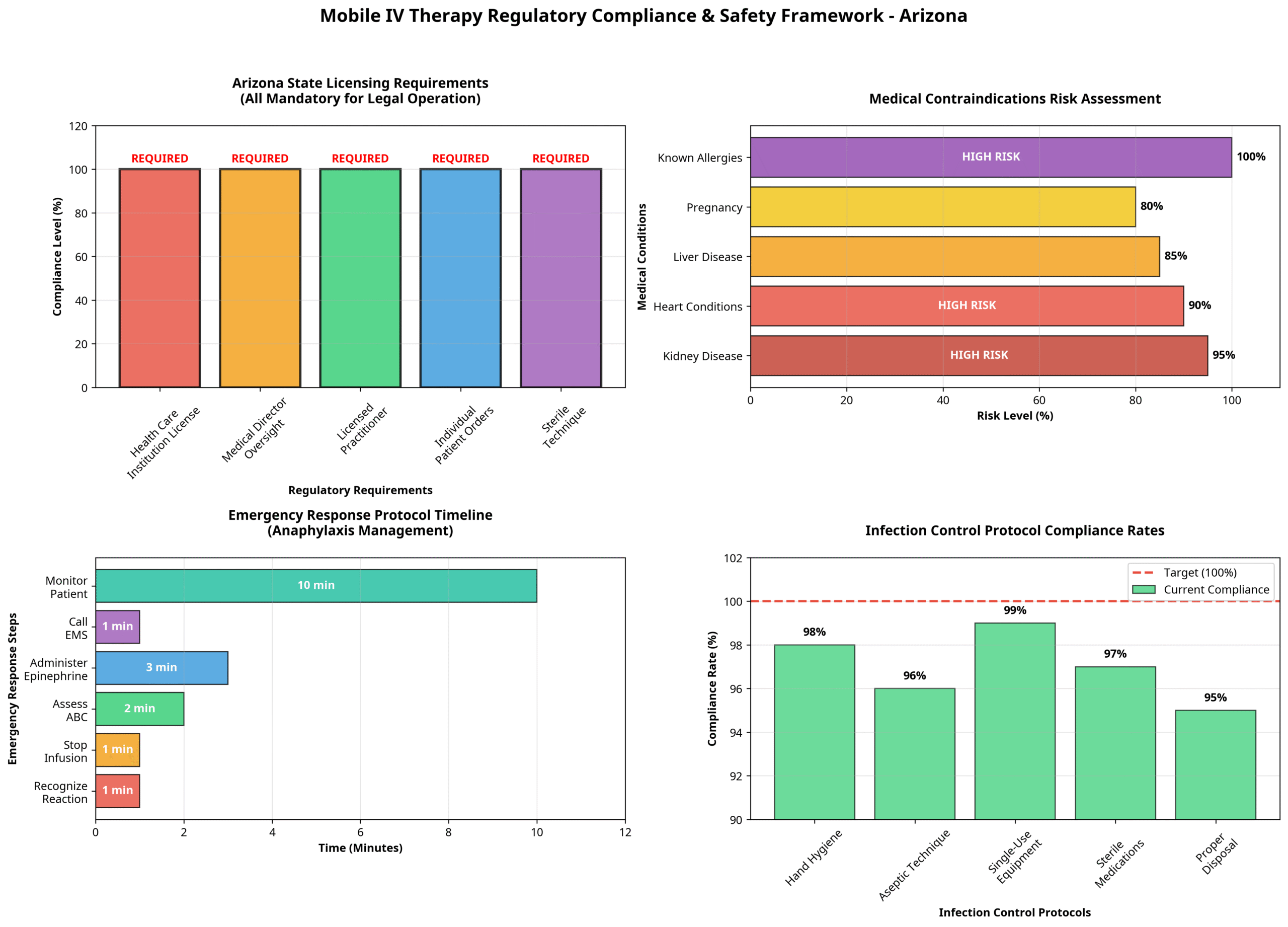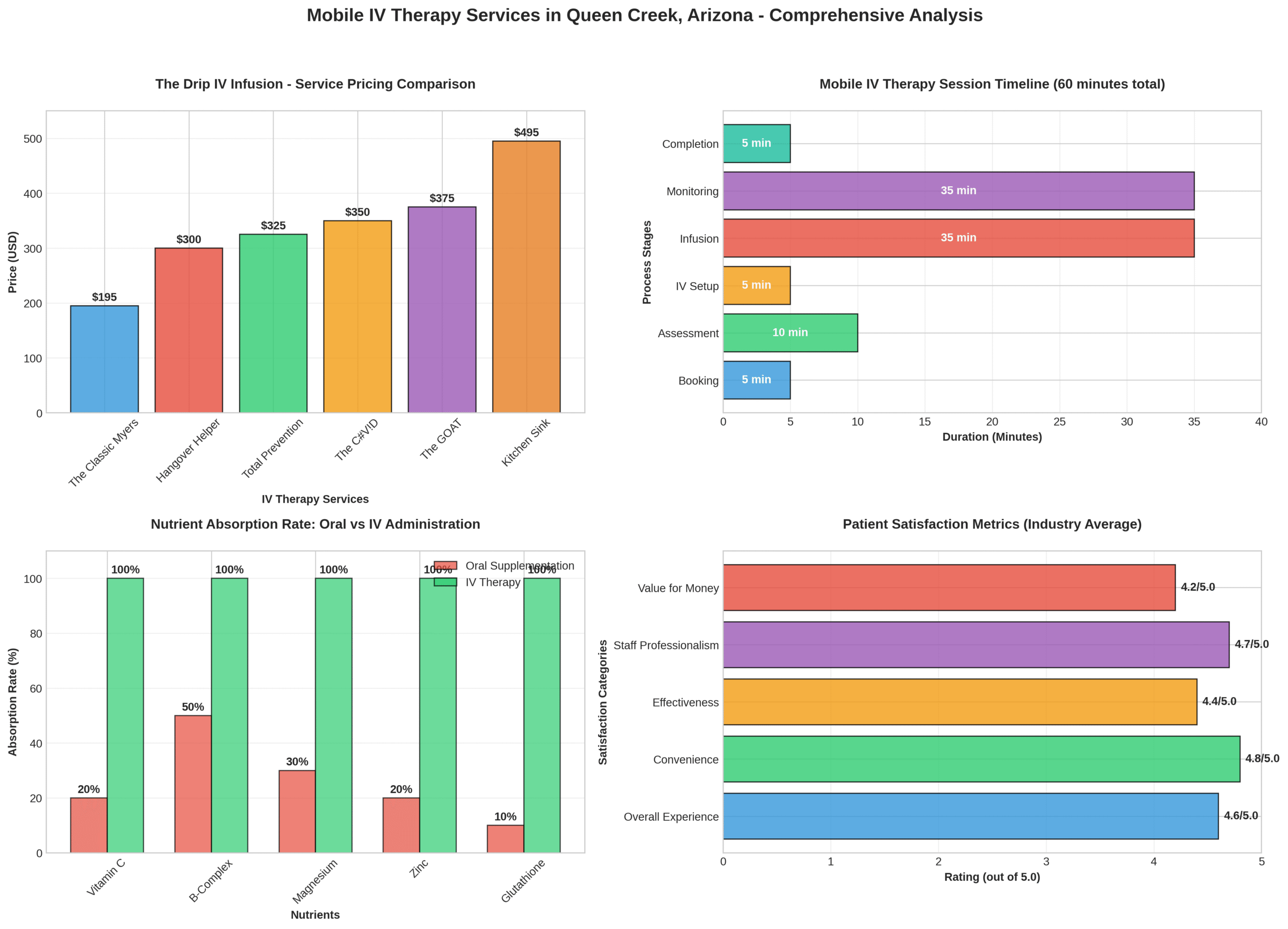Feeling the drain from Arizona’s relentless heat? Whether you’re recovering from a long day at Horseshoe Park, battling fatigue, or simply seeking a wellness boost, The Drip IV Infusion brings medical-grade hydration directly to your Queen Creek home or office. Our team of licensed registered nurses (RNs), operating under strict medical oversight, delivers convenient and effective IV therapy tailored to your needs. Forget waiting rooms and wasted time; experience the immediate benefits of 100% nutrient absorption in the comfort of your own space. Ready to feel your best? Book your mobile IV session today.
6348 S Higley Rd Ste B, Gilbert, AZ 85298
Book an Appointment NowWhat Is Mobile IV Therapy and How Does It Work in Queen Creek?
Mobile IV therapy is a medical service where licensed registered nurses administer intravenous fluids, vitamins, and medications directly into your bloodstream at your home, office, or preferred location in Queen Creek. This method bypasses the digestive system, ensuring 100% bioavailability for immediate and effective results, a significant advantage over traditional oral supplements which may only offer 20-50% absorption.
The entire process is designed for your convenience and typically lasts about 60 minutes. It begins with a simple booking, followed by the arrival of a licensed RN who conducts a brief health assessment. The infusion itself takes just 30-45 minutes while you relax, work, or watch TV. Our team adheres to the highest standards of care, including the use of sterile, single-use equipment and compliance with all Arizona-specific regulatory frameworks, ensuring a safe and professional experience every time.
Book an Appointment NowWho Provides Your IV Therapy Treatment?
The Drip IV Infusion employs licensed registered nurses (RNs) who meet Arizona State Board of Nursing requirements and work under physician oversight with prescriptive authority. Our team is not only certified in IV therapy but also brings decades of combined experience from critical care settings like emergency medicine and home health. We are proud to operate in full compliance with the September 2023 Arizona Board of Nursing advisory on IV hydration, a commitment to safety and professionalism that sets us apart. For your peace of mind, you can verify the license of any of our nurses through the Arizona State Board of Nursing’s online portal. This dedication to credentialed, experienced, and compliant care ensures you receive the safest and most effective treatment possible.
 Book an Appointment Now
Book an Appointment NowWhat Conditions and Symptoms Does IV Therapy Address?
Mobile IV therapy effectively treats dehydration, fatigue, migraines, hangovers, cold and flu symptoms, and athletic recovery by delivering hydration and nutrients directly into your bloodstream. In Queen Creek, where residents experience an average of 111 days above 100°F annually, the risk of dehydration is a constant concern. Our IV treatments offer a rapid solution for both reactive needs, such as recovering from a summer festival at Schnepf Farms, and preventive wellness, like boosting your immune system during the winter flu season. By providing your body with the precise fluids and nutrients it needs, IV therapy can help you maintain peak performance and well-being year-round.
| Condition | Common Symptoms | How IV Therapy Helps |
|---|---|---|
| Dehydration | Fatigue, dizziness, dry mouth, dark urine | Rapid fluid replacement with electrolytes |
| Hangovers | Headache, nausea, fatigue, dehydration | Hydration, anti-nausea medication, B vitamins |
| Migraines | Severe headache, light sensitivity, nausea | Magnesium, hydration, anti-inflammatory medication |
| Cold & Flu | Fatigue, body aches, congestion, fever | Immune-boosting vitamins (C, zinc), hydration |
| Athletic Recovery | Muscle soreness, fatigue, dehydration | Amino acids, electrolytes, anti-inflammatory support |
| Food Poisoning | Nausea, vomiting, dehydration, weakness | Rapid rehydration, anti-nausea medication, electrolytes |
| Jet Lag | Fatigue, sleep disruption, dehydration | Energy-boosting B vitamins, hydration, antioxidants |
| Chronic Fatigue | Persistent exhaustion, brain fog, weakness | B-complex, vitamin C, magnesium, CoQ10 |
What IV Packages and Treatments Are Available?
The Drip IV Infusion offers six primary IV packages ranging from $195 to $495, each formulated with specific vitamins, minerals, and medications to address different wellness goals. All our ingredients are sourced from FDA-regulated pharmacies to ensure the highest quality and safety. We also offer customization with a variety of add-ons for just $30 each, allowing you to tailor your treatment to your specific needs. For your convenience, we accept HSA/FSA payments for eligible treatments and offer group discounts for corporate events, parties, and athletic teams.
| Package | Price | Key Ingredients | Best For |
|---|---|---|---|
| The Classic Myers | $195 | Vitamin C, B-complex, magnesium, calcium, zinc | General wellness, immune support, energy |
| Hangover Helper | $300 | Hydration, B vitamins, anti-nausea medication, electrolytes | Alcohol recovery, nausea relief |
| Immune Boost | $250 | High-dose vitamin C, zinc, glutathione, B-complex | Cold/flu prevention, immune support |
| Athletic Performance | $350 | Amino acids, B vitamins, magnesium, electrolytes, taurine | Pre/post workout, muscle recovery |
| Beauty & Wellness | $275 | Biotin, vitamin C, glutathione, B-complex | Skin health, anti-aging, hair/nail support |
| The Kitchen Sink | $495 | All vitamins, minerals, antioxidants, NAD+ | Comprehensive wellness, chronic fatigue |
Popular Add-Ons:
- Glutathione
- NAD+
- Vitamin B12
- Anti-Nausea Medication
- Pain Relief Medication
 Book an Appointment Now
Book an Appointment NowHow Much Does Mobile IV Therapy Cost in Queen Creek?
The Drip IV Infusion offers Mobile IV therapy in Queen Creek ranging from $195 to $495 per session. We offer transparent pricing and accepting HSA/FSA payments for eligible treatments. When considering the cost, it’s important to evaluate the value. A single mobile IV session can provide immediate relief and 100% nutrient absorption, a significant advantage over other options. There are no hidden fees, and our pricing includes the travel and expertise of a licensed RN coming directly to you.
| Option | Cost | Time | Absorption | Convenience |
|---|---|---|---|---|
| Mobile IV Therapy | $195 – $495 | 60 min total | 100% | Comes to you |
| Urgent Care IV | $300 – $1,000+ | 2-4 hours | 100% | Must travel, wait |
| Oral Supplements (monthly) | $50 – $150 | Daily | 20-50% | Purchase, remember daily |
| Hydration Drinks | $3 – $5 each | Hours | Partial | Purchase, consume multiple |
Is Mobile IV Therapy Safe and Who Should Avoid It?
Mobile IV therapy is safe when administered by licensed healthcare professionals following CDC infusion safety guidelines, though certain medical conditions require screening or physician clearance before treatment. At The Drip IV Infusion, your safety is our top priority. We conduct a thorough medical history review for every client to screen for contraindications, such as kidney disease, heart failure, or certain allergies. Our nurses are equipped with emergency medications and are CPR certified. While side effects are rare, they can include minor bruising at the injection site or, in very rare cases, an allergic reaction. We believe in full transparency and will discuss all potential risks with you beforehand. If you have a complex medical history, we recommend consulting with your primary care physician before scheduling an appointment.
Book an Appointment NowWhat Should First-Time Users Expect?
First-time IV therapy users can expect a straightforward 60-minute experience beginning with a brief health assessment, followed by a comfortable 30-45 minute infusion while relaxing at home. Our nurse will arrive with all necessary equipment, explain the process, and answer any questions you may have. The IV insertion feels like a small pinch, similar to a blood draw. During the infusion, you can work, watch TV, or simply relax. Most clients report feeling the positive effects, such as increased energy and hydration, within an hour of treatment. After the session, our nurse will provide you with post-care instructions and answer any final questions.
How Often Should You Get IV Therapy?
IV therapy frequency depends on your wellness goals, with some clients using treatments reactively for hangovers or illness, while others schedule weekly or monthly sessions for ongoing health optimization. For acute issues like a hangover or migraine, a single session is usually sufficient. For chronic conditions or proactive wellness, a weekly or bi-weekly schedule may be more beneficial. During the hot summer months, many clients opt for more frequent hydration drips. Our team can help you create a personalized treatment plan based on your individual needs and goals.
Where in Queen Creek Do You Provide Service?
The Drip IV Infusion serves all of Queen Creek, including neighborhoods near Ellsworth Loop, Rittenhouse Road, and areas surrounding Horseshoe Park and San Tan Mountain Regional Park. We also provide service to the surrounding communities of Gilbert, Chandler, Mesa, and San Tan Valley. Our mobile service brings IV therapy to your home, office, hotel, or even a local gym. We can typically have a nurse at your location within 60-90 minutes of booking, providing you with fast and convenient relief wherever you are.
How Do You Book Mobile IV Therapy in Queen Creek?
Booking mobile IV therapy with The Drip IV Infusion takes just minutes through our online scheduling system, phone call, or text message, with same-day appointments often available. Simply visit our website to book online, or call or text us at (602) 341-3511. Be prepared to provide your location, preferred time, and a brief medical history. We offer flexible scheduling to accommodate your busy life. Group and corporate bookings are also available and can be arranged with our scheduling team.
Book an Appointment NowReady to experience the benefits of mobile IV therapy? Contact us today to book your appointment and start your journey to better health and wellness. Our team is committed to providing the Queen Creek community with safe, professional, and convenient IV hydration services. We look forward to helping you feel your best.
